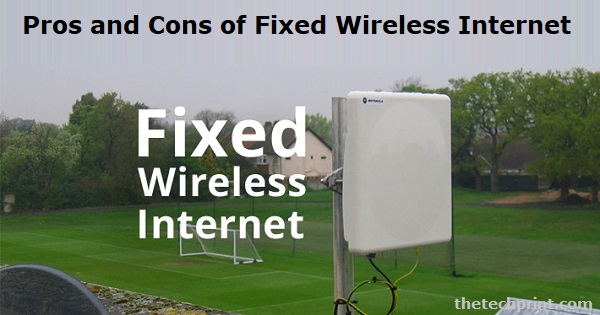There are currently 1,769 fixed wireless ISPs in the United States, with more than 50% coverage across the country. Fixed wireless internet broadband or FWI connection uses an external antenna to connect to the internet. It's a popular choice for people in more rural areas who may not have access to other types of broadband, such as cable or fiber optic. However, there are some definite pros and cons to fixed wireless internet for businesses and homes. So if you consider choosing a broadband internet connection, you should keep these things in mind.
From coverage to high speed, there are many pros of fixed wireless internet which you should know in detail.
One of the most exciting features of fixed wireless broadband is its potential to offer high-speed broadband internet to households and businesses that do not currently have it. Because cable and fiber networks need significant infrastructure investments, they generally don't expand into sparsely populated regions. However, we can establish fixed wireless internet in underserved areas since our installation process is far less resource-intensive.
The expansion of fixed wireless internet also means increased competition in the marketplace for broadband providers. This is good news for customers, as it drives down prices and gives consumers more choices when selecting an ISP.
One of the significant pros of fixed wireless internet over other types of broadband is that it can offer redundancy. For example, if a single fiber line serves your business or home and there's an issue with that line, you're out of luck until it gets fixed. With fixed wireless, however, your connection will be backed up by radio waves, so if one link goes down, you can still stay online.
Fixed wireless internet is also much more portable than other types of broadband. For example, if you move, you can just take your equipment and set it up at your new location. With different types of broadband, such as cable or fiber, you would have to start the process again to get hooked up at a new address.
Another significant advantage of fixed wireless internet is that it's very scalable. As your business grows and you need more bandwidth, we can easily accommodate your needs by adding more capacity to our network.
Like everything else, nothing is perfect in this world, and so is broadband service. Here are some of the considerable cons of fixed wireless internet.
The biggest downside to fixed wireless internet is that it's unavailable everywhere. Because our network relies on line-of-sight connections, we can only provide service to locations within range of one of our towers. So if you're in a rural area, there's a good chance we can reach you, but if you're in a densely populated city center, it might not be possible to get our signal.
Another potential issue with fixed wireless internet is interference. Trees, buildings, and other obstacles can interfere with radio waves. This can cause your connection to be slower or even drop altogether. However, our technicians are experts at finding the best place to install your equipment to minimize interference.
Bad weather can also affect your fixed wireless connection. Heavy rains, snow, and even high winds can interfere with the radio waves that carry our signal to you. However, our network is designed to be highly redundant, so even if one tower goes down, others can pick up the slack.
If there's a power outage at your location, your fixed wireless internet will go down along with everything else. However, you can solve this problem by getting a backup battery for your router. That way, if the power does go out, you'll still be able to stay online. Frequent power outages can be serious cons of fixed wireless internet.
Conclusion
Fixed wireless internet is a great option for people who want reliable, high-speed internet but don’t want to pay the high prices of cable. It can also be a good choice for businesses that need fast, consistent service. However, there are some drawbacks to fixed wireless. One is that it can be more expensive than other options. Another is that it can be less reliable in bad weather conditions or during power outages. Before you decide, it’s important to weigh the pros and cons of fixed wireless internet and see what will work best for your needs.

The reliability of wireless internet is excellent. Unlike satellite internet, it has low latency and doesn't suffer from bad weather conditions. As a result, it's a perfect choice for rural telecommuters, company staff, and home ISPs.
Wireless revolutions generally come with the promise of reduced installation costs and faster installation times. And contrary to popular belief, getting it done quicker doesn't necessitate a decrease in network performance. Fixed wireless point-to-point networks have historically outperformed fiber.
A satellite wireless service depends on line-of-sight connectivity between the subscriber and a ground station. In some cases, slopes or trees obstruct its installation. In addition, the quality of the service can be hampered by rain or fog.
Fiber internet is faster and more dependable than 5G technology, with many experts opting for it. A fiber connection can easily handle your online demands 100 times quicker than traditional broadband.
The antenna we put on the roof is a modem and a radio receiver/transmitter, so all you need is a WiFi Router to take the connection from the antenna and send it to your devices locally inside your house.